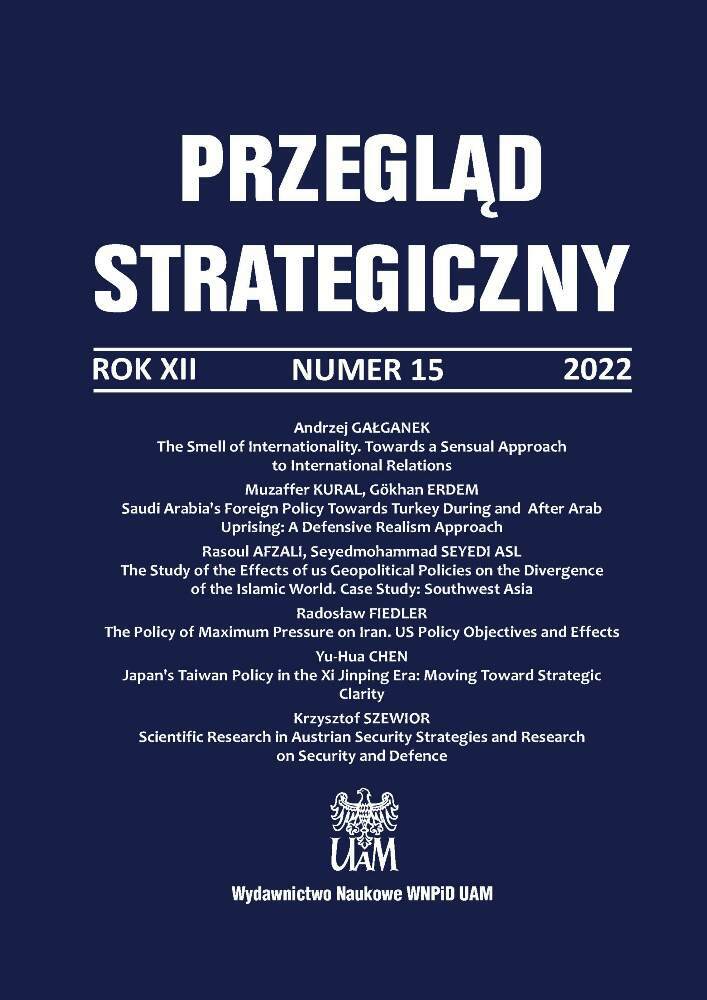Abstract
The Arab Uprisings in 2011 have led to redistribution of power in the Middle East. It has brought challenges and opportunities for regional powers such as Saudi Arabia and Turkey. While Turkey has perceived the developments as an opportunity to increase its influence in the region, it has created threat perceptions for Saudi Arabia’s hegemony in the Middle East. Especially, due to Turkey’s rising influence in Egypt and Syria it has been perceived as a second rival, after Iran, by Riyadh. This article argues that due to Turkey’s rising power in Egypt and Syria, Saudi Arabia’s foreign policy towards Turkey has been shifting by supporting local actors in Egypt and Syria in order to maintain the status quo. The paper aims to analyze shifts in Saudi Arabia’s foreign policy towards Turkey during and post-Arab uprisings in the Middle East in the framework of defensive realism through the regional level of analysis.
References
Abueish T. (2020), Muslim Brotherhood is a terrorist group: Saudi Arabia's Council of Senior Scholars, available at: https://english.alarabiya.net/News/gulf/2020/11/11/Muslim-Brotherhood-is-a-terrorist-group-Saudi-Arabia-s-Council-of-Senior-Scholars.
Al-Awsat A. (2018), Saudi Arabia Gives $100 Million to Northeast Syria, available at: https://english.aawsat.com//home/article/1366046/saudi-arabia-gives-100-million-northeast-syria.
Almhamdi S. (2012), Saudi Arabia: No to Fundraising for Syria, available at: https://globalvoices.org/2012/06/09/saudi-arabia-no-to-fundraising-for-syria/.
Al-Rasheed M. (2010), A history of Saudi Arabia, Cambridge University Press, Cambridge. https://doi.org/10.1017/CBO9780511993510 DOI: https://doi.org/10.1017/CBO9780511993510
Altunışık M. (2019), Turkey's Relations with Egypt And Saudi Arabia: From Hopes of Cooperation to the Reality of Conflict, in: Aspiring Powers, Regional Rivals: Turkey, Egypt, Saudi Arabia, and the New Middle East, The Middle East Institute, Washington: 17-37.
Altunisik M. B. (2012), Bitter Frenemies The Not-Quite-Alliance Between Saudi Arabia And Turkey, available at: https://www.foreignaffairs.com/articles/turkey/2012-05-15/bitter-frenemies.
Anon (2012), Davutoğlu Esad'a yine ömür biçti, available at: https://www.evrensel.net/haber/35076/davutoglu-esada-yine-omur-bicti.
Anon (2019), The Saudi-Turkish antagonism, "Strategic Comments", 25(5): iv-vi, https://doi.org/10.1080/13567888.2019.1635344. DOI: https://doi.org/10.1080/13567888.2019.1635344
Baskan B. (2016), Turkey and Qatar in the Tangled Geopolitics of the Middle East, Palgrave MacMillan, London. https://doi.org/10.1057/978-1-137-51771-5 DOI: https://doi.org/10.1057/978-1-137-51771-5
Başkan B. (2019), Turkey between Qatar and Saudi Arabia: Changing Regional and Bilateral Relations, "Uluslararasi Iliskiler": 85-99.
Cafiero G. (2019), To Counter Turkey, Saudi Arabia Backs the YPG in Syria, available at: https://politicstoday.org/to-counter-turkey-saudi-arabia-backs-the-ypg-in-syria/.
Czornik K. (2020), Saudi Arabia as a Regional Power and an absolut Monarchy Undergoing Reforms. Vision 2030 - the Perspective of the end of the Second Decade of the 21st Century, "Przegląd Strategiczny", X(13): 179-198. https://doi.org/10.14746/ps.2020.1.11 DOI: https://doi.org/10.14746/ps.2020.1.11
Dalacoura K. (2013), The Arab Uprisings Two Years On: Ideology, Sectarianism and the Changing Balance of Power in the Middle East, "Insight Turkey": 75-89.
Davutoglu A. (2011), The opening of the Africa-Turkey Partnership Ministerial Review Conference, 16 December 2011, Istanbul, available at: http://www.mfa.gov.tr/the-opening-of-the-africa-turkey-partnership-ministerial-review-conference-16-december-2011.en.mfa.
Destradi S. (2010), Regional powers and their strategies: empire, hegemony, and leadership, "Review of International Studies": 903-930. https://doi.org/10.1017/S0260210510001361 DOI: https://doi.org/10.1017/S0260210510001361
Dumke D. (2019), Saudi Foreign Policy 1932-2001: Egypt, Turkey, and Regional Priorities, in: Aspiring Powers, Regional Rivals: Turkey, Egypt, Saudi Arabia, and the New Middle East, (ed.) G. T. a. D. Dumke, Middle East Institute, Washingtonpp: 56-70.
Ennis C. A., Momani B. (2013), Shaping the Middle East in the Midst of the Arab Uprisings: Turkish and Saudi foreign policy strategies, "Third World Quarterly", 34(6): 1127-1144. https://doi.org/10.1080/01436597.2013.802503 DOI: https://doi.org/10.1080/01436597.2013.802503
Gregory F., Gause I. (2011), Saudi Arabia's Regional, in: International Politics of the Persian Gulf, Syracuse University Press, New York: 169-183.
Ibish H. (2018), Saudi Arabian-Turkish rivalry in the Middle East, Middle East Policy, Washington: 9-13.
Jackson R. (2007), Regime security. Contemporary security, 5th ed., Oxford University Press, Oxford.
Jacobs J. (2012), The danger that Saudi Arabia will turn Syria into an Islamist hotbed, available at: https://www.csmonitor.com/Commentary/Opinion/2012/0412/The-danger-that-Saudi-Arabia-will-turn-Syria-into-an-Islamist-hotbed.
Jervis R. (1978), Cooperation Under the Security Dilemma, "World Politics": 167-214. https://doi.org/10.2307/2009958 DOI: https://doi.org/10.2307/2009958
Lacroix S. (2014), Saudi Islamists and the Arab Spring, LSE, London.
Lake D. A. (2009), Regional Hierarchy: Authority and Local International Order, "Review of International Studies": 35-58. https://doi.org/10.1017/CBO9781139087339.003 DOI: https://doi.org/10.1017/CBO9781139087339.003
Lobell S. E. (2017), Structural Realism/Offensive and Defensive Realism, "Oxford Research Encyclopedia of International Studies". https://doi.org/10.1093/acrefore/9780190846626.013.304 DOI: https://doi.org/10.1093/acrefore/9780190846626.013.304
McDowall A. (2012), Rise of Muslim Brotherhood frays Saudi-Egypt ties, available at: https://www.reuters.com/article/us-saudi-egypt-brotherhood/rise-of-muslim-brotherhood-frays-saudiegypt-ties-idUSBRE8400ZM20120501.
Menoret P. (2016), Crown Center for Middle East Studies, available at: https://www.brandeis.edu/crown/publications/middle-east-briefs/pdfs/101-200/meb101.pdf.
Nolte D. (2010), How to compare regional powers: analytical concepts and research topics, "Review of International Studies": 881-901. https://doi.org/10.1017/S026021051000135X DOI: https://doi.org/10.1017/S026021051000135X
Nordland R. (2013), Saudi Arabia Promises to Aid Egypt's Regime, available at: https://www.nytimes.com/2013/08/20/world/middleeast/saudi-arabia-vows-to-back-egypts-rulers.html.
Ryan C. R. (2009), Inter-Arab alliances: Regime security and Jordanian foreign policy, First ed.: University Press of Florida, Florida. https://doi.org/10.2307/j.ctv345pcpg DOI: https://doi.org/10.2307/j.ctv345pcpg
Taliaferro J. W. (2000), Security Seeking under Anarchy: Defensive Realism Revisited, "International Security": 128-161. https://doi.org/10.1162/016228800560543 DOI: https://doi.org/10.1162/016228800560543
Tang S. (2010), A Theory of Security Strategy for Our Time: Defensive Realism, Palgrave Macmillan, New York. https://doi.org/10.1057/9780230106048 DOI: https://doi.org/10.1057/9780230106048
Venetis E. (2014), The Struggle between Turkey and Saudi Arabia for the Leadership of Sunni Islam, available at: https://css.ethz.ch/en/services/digital-library/publications/publication.html/176753.
Waltz K. N. (1979), Theory of International Politics, McGraw Hill, New York.
Zarras K. (2018), Assessing the Regional Infl uence and Relationsof Turkey and Saudi Arabia After the ArabSpring, in: Turkey's Relations with the Middle East: Political Encounters after the Arab Spring, Springer International Publishing, Cham: 117-131. https://doi.org/10.1007/978-3-319-59897-0_8 DOI: https://doi.org/10.1007/978-3-319-59897-0_8
License
Copyright (c) 2022 Muzaffer Kural, Gökhan Erdem

This work is licensed under a Creative Commons Attribution 4.0 International License.

